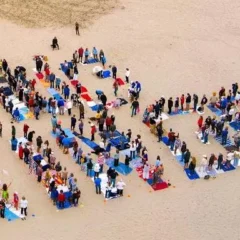“How Then Shall We Live?” is a series of conversations that examines critical issues shaping how humanity lives together today: the environment, polarization and artificial intelligence. Experts will share their perspectives on the path forward for society. These discussions will prompt participants to consider their own lives in the light of climate change, divisiveness and technological development.
Our host Ken Chitwood is the Scholar-in-Residence at First Lutheran Venice and an affiliated scholar with the USC Center for Religion and Civic Culture.
Location:
First Lutheran Venice
815 Venice Blvd.
Venice, CA 90291
(Google Map)
Co-sponsored by the USC Center for Religion and Civic Culture, which advances the understanding of religion and society, and supports faith and community leaders in becoming full partners in the work of positive social change.
How Then Shall We Live?
When the Earth is On Fire
The reality of climate change is becoming evident in weather patterns and natural disasters. Listen to a conversation with Bekah Estrada of California Interfaith Power & Light about how we can care for the environment while adapting to a hotter world.
Takeaways:
- Climate change is affecting people’s lives now. Bekah experienced climate migration as a child, with her family leaving farming due to prolonged draught.
- Reframe the conversation: Communal instead of individual; kin with nature instead of consumer of resources; living healthier instead of sacrificing freedom
- On climate anxiety: My faith provides hope, and it’s also there for me when I don’t have hope. If I’m lacking faith and hope, then I lean into love.
- Story of Jonah suggests societal transformation is possible.
- Faith leaders have to be a moral voice on climate.
- CA Interfaith Power & Light does education, advocacy (representing a network of 750 congregations statewide), and action, supporting congregations to become energy efficient and community resilience hubs.
Learn more and get involved:
How Then Shall We Live?
When Nobody Gets Along
Whether it’s conflicts in other countries, political divides closer to home, or arguments between family members and friends, tension is part and parcel to life in the modern world. How can people of any faith or none contribute to peace in a world of violence and polarization?
Drawing on his reporting and research across the globe, scholar, journalist and theologian Ken Chitwood shares practical and conceptual tools to help the community attend to some of the most contentious issues of our time.
Takeaways:
- We all have someone or a group we consider the other, or “they”
- “Banal Cosmopolitanism” – our diversity means that ideas about being and belonging are under threat and flux
- Silo-ization – Technology enhances age-old habit of placing limits on our social circles, sharing resources selectively
- Two-way communication versus one-way communication – In this context, we are more likely to create and consume ideas/media that reinforce silos than engage in back and forth dialogue.
- This is a challenge for congregations and preaching, which often utilize one-way communication.
- Promise of Paradox – Personal conflict, embracing differences creates greater creativity, flexibility and productivity
- Book of Hebrews Chapter 10 – “Consider how to stir up one another love and Good Deeds” – “stir up one another” meant severe argument based on deep difference
- Examples from Muslim-Christian Dialogue –
- Miss Understanding / Two Faiths, One Friendship, Los Angeles
- Said and Lody, Amsterdam
- Alissa Wahid, Gusdurian Network Indonesia
- Principles of Dialogue – Unconditional respect; mutual consultation in pursuit of common understanding; not conversation, not debate; mutual respect and sustainable relationships
- Practices of Dialogue –
- Safe Space
- Goal is learning
- Use appropriate communications
- Ground rules (such as listening attentively, being curious, allowing everyone to share, discussing ideas and not people, assuming best intention)
- Take Risks – share real feelings and who you are
- Place the people/relationships first
- Gradually address difficult questions (built up to it and don’t end with them)
- Don’t avoid the tough stuff
- Expect to be transformed
- And bring transformation to other
How Then Shall We Live? When AI Takes Over
Artificial Intelligence can make our everyday lives easier and speed along innovation. It also looms as a sci-fi threat that can be weaponized against people, endanger livelihoods, squash human creativity and exacerbate divisions. Join us for a conversation about what it means to be human in an age of rapidly transforming technologies.
Ken Chitwood was joined by scholars studying different sides of Artificial Intelligence:
- Darby Vickers, Assistant Professor of Philosophy, University of San Diego
- Stephen Aguilar, Associate Professor of Education, USC Rossier
- Ulf Hermjakob, Senior Research Scientist, USC Information Sciences Institute
Dive Deeper:
How can you use AI to enhance preaching — without replacing the preacher? Watch AI Tips for Preachers





